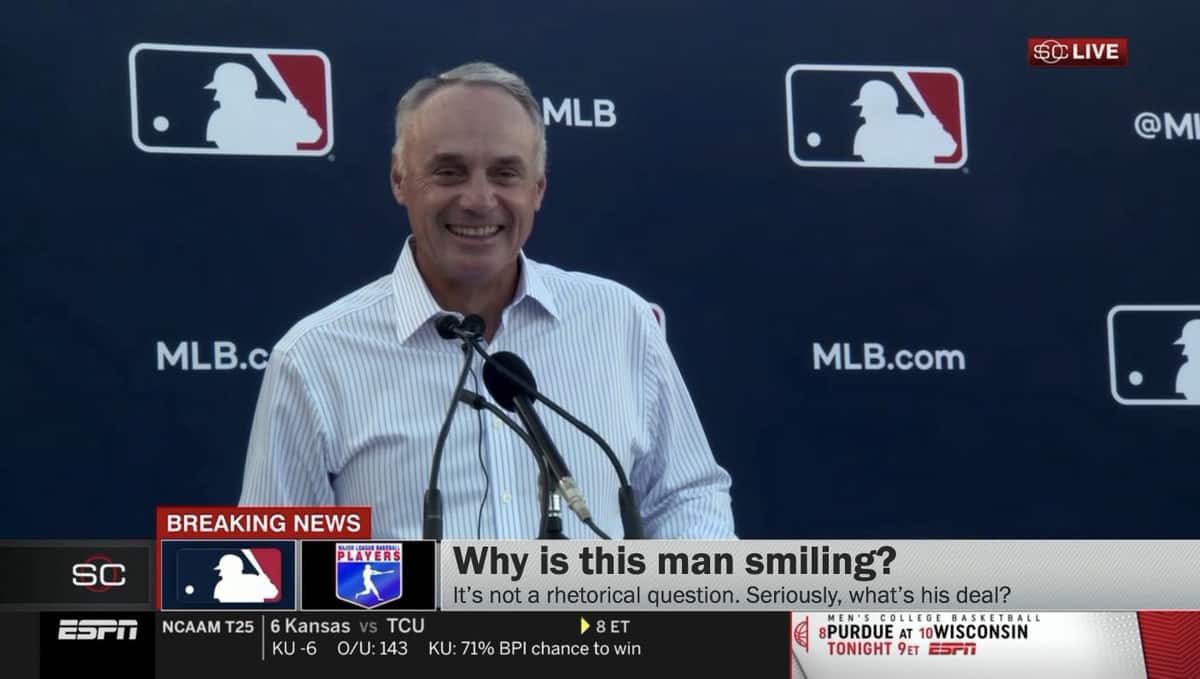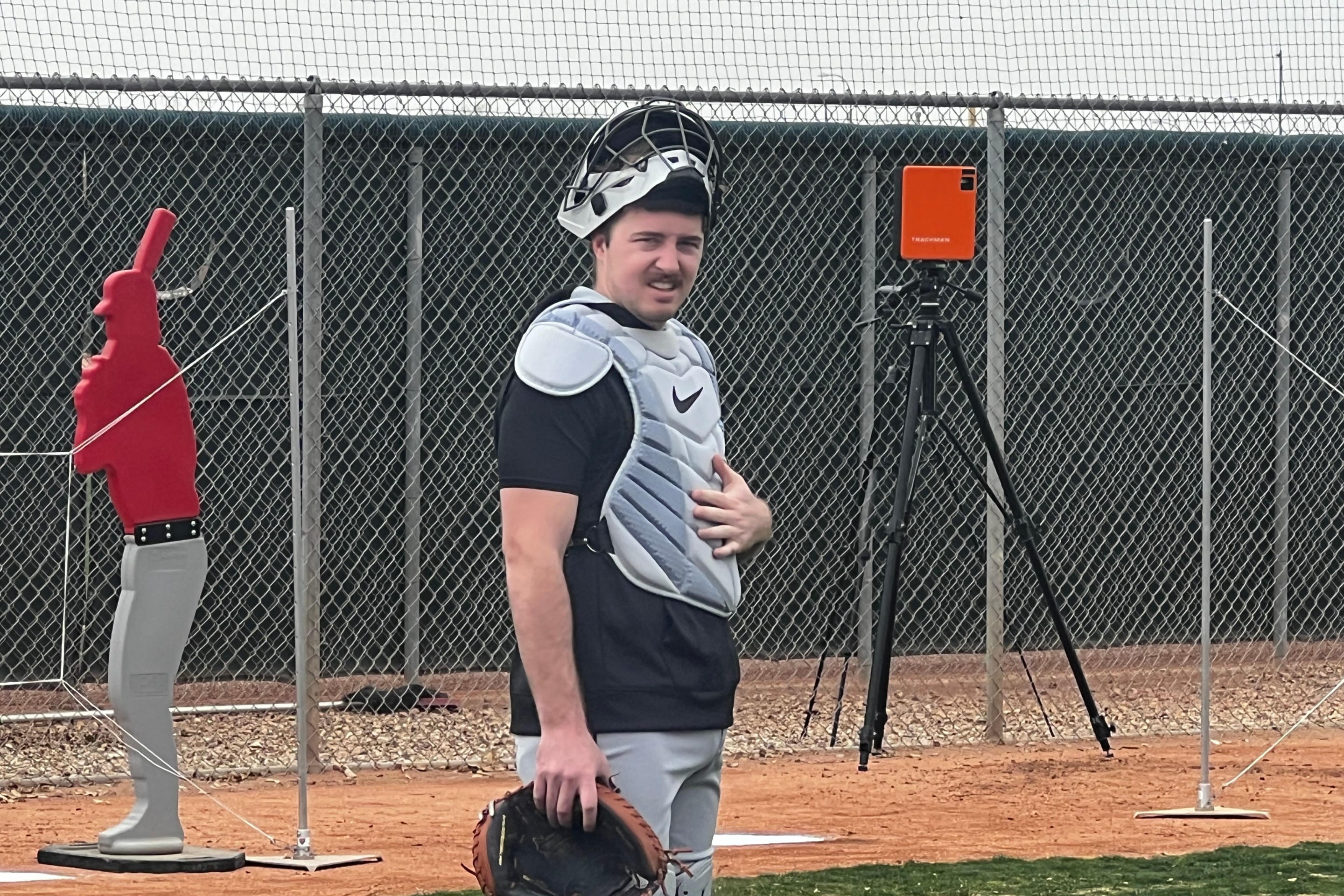When Rob Manfred called the prospect of missed games "a disastrous outcome for this industry," I assumed that it signaled intent on the owners' part to strike a deal. They just wanted to wait for the MLBPA to drop its demands for an overhaul of the player compensation system, settling for the most modest of concessions to the players under the existing architecture.
I didn't think he'd be dumb enough to lead the league into that pit, and without any attempt to cover his tracks. Manfred and the owners locked out the players as soon as possible, followed by 43 days without a proposal. The first cancellation of games -- an action "forced" by an arbitrary deadline the league set -- was preceded on Monday by a PR flurry of fake optimism with a marathon "bargaining" session conveyed through friendly reporters.
There were holes in that eleventh-hour story -- most notably the lack of any reference to the competitive-balance tax threshold -- and sure enough, the players made their disgust known on Tuesday.
Likewise, Manfred's letter to fans was equally riddled with gaps in the timeline and lies of omission to anybody half-following the proceedings.
The lack of caring is shocking, even down to the shoddiness of basic tracks-covering. Maybe that's why he wasn't all that heavy-hearted when he delivered his update to the assembled media in Jupiter, Fla.
The first two series of the season are already off the league calendar, and White Sox season-ticket holders were informed that they can apply credit to future games, assuming there are any.
None of this was necessary -- the lockout, the delay, the deadlines, the cancellations. Nothing has forced the owners' hands. That's why Manfred was correct in calling it "a disastrous outcome." That's why it's so baffling that he steered this ship so gleefully into it.
A decade or so ago, the White Sox had a nasty habit of griping about disappointing attendance. While they might've wanted more support, it took them years to realize that shaming fans only inspired them to list all the reasons why going to White Sox games isn't worth it. After several encounters with the rake, they finally realized that praising the fans who were there provided better vibes.
The league is courting a similar kind of dissent. Despite record revenues, Manfred publicly dwells on the money teams allegedly haven't made.
The thing is, they're lucky to have made that money. It's not a fluke per se, but the sport has generated this revenue with technology and canny broadcast and partnership deals, not runaway popularity. The game has immense trouble lowering the age of its fan base, or getting the entirety of the country to know its best players, or generating action or picking up the pace of play. It doesn't seem smart to take the people who happily watch Major League Baseball despite all the warts and make them think of all the possible better ways to spend one's time.
Which is also not ideal for those of us who rely on those who want to devote that time to baseball.
Following the coverage of the labor issue, there's a sizable (or at least loud) contingency of fans who wonder why baseball writers have agreed with the players at a near-unanimous level. That kind of doubt is to be expected, because we're conditioned to hear out both sides, even in an environment where one side is doing 90 percent of the destruction. The sentiment has been so slanted toward labor that the media must be in the bag for the players, save an MLB.com that has turned into Baseball Pravda.
Set that natural urge for centering aside and the logic dissolves instantly. Nobody in baseball media benefits from the absence of a deal, because when beats disappear, jobs can follow. Their self-interest should have them pushing for any agreement. The players could sign a deal that restores the reserve clause, and while it'd be a horrendous mistake on their part, it'd be great news for your local writer or talker. As the transactions thawed, I'd have as much fun watching my Google Analytics page as I would MLB Trade Rumors. I'd also ask Dan Szymborski to run Lucas Giolito's ZiPS projections through his age-45 season.
The incentives are at such cross purposes that, if the league's negotiation tactics were anything close to honest and its offers resembled anything like give and take, you'd probably see a lot more writers telling the MLBPA to suck it up and get something done, even if that something is distant from the best the union can attain.
But no, it's been on Manfred and the owners every step of the way. If Ken Rosenthal still represents down-the-middle baseball coverage, he gives you some idea of where the center lies.
Oh, Manfred and the owners will object to that very premise, tell you all about their love for the game and how the other side is more to blame. Manfred said it himself Tuesday, “If it was solely within my ability or the ability of the clubs to get an agreement, we’d have an agreement.” Yep, if not for those damn players that fans pay to see — if only Manfred and Co. could remove them from these negotiations the way they scrubbed them from the league’s website — then everything would be all right.
Manfred and Co. think the fans will come back, because they always come back. They think the players ultimately will break, and in fact that might be the league’s goal. The owners initiated a lockout three months ago, then made a belated, strategic bull rush toward the players on Monday and Tuesday. Naturally, their last-minute pressure backfired, just as everything in this relationship backfires. As Manfred listed all of the wonders in the league’s “best and final” offer, it was as if he could not believe the players’ ingratitude.
If Jerry Reinsdorf and friends were so hellbent on achieving the "disastrous outcome" with the first missed games due to labor strife since 1995, then we probably shouldn't try to put boundaries on their appetite for destruction. That makes it hard to anticipate how everything will recover.
I'm not inclined to say baseball can't bounce back. Despite all the fans questioning their loyalty, this could end up being a mere blip. Major League Baseball is a monopoly, and fans who want to see it played and examined at the highest level only have one place to go.
I also don't want to blithely ignore the utter disregard and contempt the owners have shown for everybody who isn't them, because that's new. OK, it's probably been there all along, but it's public visibility is heightened. There's exercising leverage, and then there's straight bullying, and the owners' eager rush to the latter caused a normally labor-agnostic media to side with the players despite the inherent incentives to push for a deal of any kind. If that's evidence of Manfred's radioactive energy altering the landscape, then we can't just assume the damage can be so easily contained.






